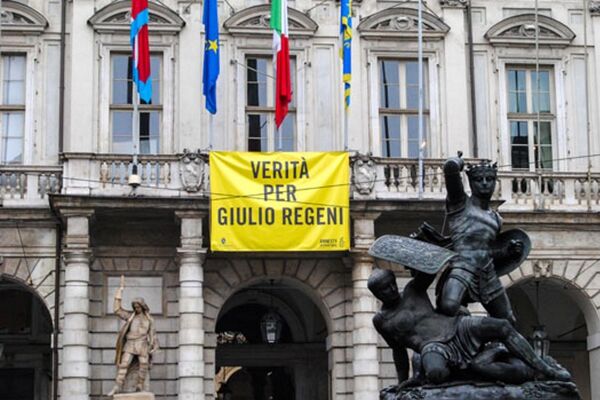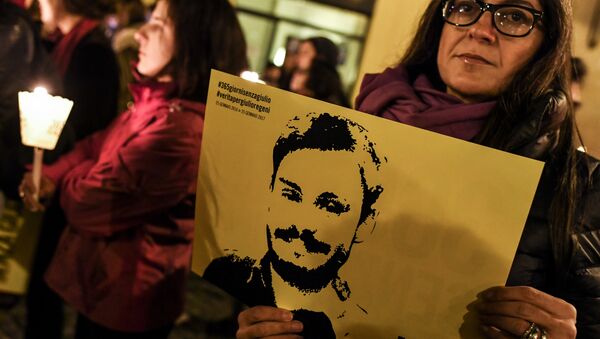Prosecutors in Rome formally opened an investigation on Tuesday, December 4, into five suspects — Major General Sabir Tareq, Colonel Ather Kamal, Major Magdi Abdlaal Sharif, Captain Osan Helmy and his aide Mahmoud Najem — who are believed to be responsible for Regeni's death in January 2016.
The Egyptian government rejected the Italian investigation and said "charges should be based on evidence and not suspicions."
Regeni, a 28-year-old Cambridge University graduate, vanished on January 25, 2016 after leaving his apartment in the Dokki neighbourhood of Cairo to meet a friend in the city centre.
"I am going out," Regeni texted his girlfriend at 7.41pm.
No Sign of Regeni For Nine Days
But Regeni, who had been researching trade union activities in Egypt for a PhD, never arrived at his friend's apartment and his body was not found until February 3, 2016.
Egypt’s State Information Service’s statement on the murdered Italian student Giulio Regeni, after Italy added several Egyptian NSA agents to a preliminary list of suspects last week. It inexplicably mentions Regeni entering on the wrong visa, almost 3 years after the incident. pic.twitter.com/0CTO1iZeIb
— Ruth Michaelson (@msrmichaelson) 2 December 2018
The corpse had been dumped in a ditch next to the main road from Cairo to Alexandria.
But Major General Khaled Shalaby — who was once given a suspended sentence for kidnapping and torturing an Egyptian dissident — told the press there were no signs of foul play and suggested Regeni had been hit by a car.
Forced to admit the body had been partially stripped and showed signs of violence and torture, the Egyptians changed tack and sought to find convenient scapegoats.
On March 24, 2016 the Egyptians claimed police had killed four men in a shootout and the Ministry of the Interior suggested they had been part of a gang which kidnapped foreigners and stole their money.
But this clumsy attempt to divert attention failed when Italian investigators found mobile phone records which showed the gang's leader, Tarek Abdel Fattah, was 60 miles from Cairo on the day he supposedly kidnapped Regeni.

Several witnesses also claimed the four Egyptians had been executed in cold blood by the police, rather than being killed in a shootout.
The Egyptians carried out an autopsy on Regeni but the results have never been made public.
Rome prosecutors have placed five Egyptian security officials under investigation in relation to the death of Italian PhD researcher Giulio Regeni in 2016, the Italian state news agency ANSA reported on Tuesday https://t.co/a9XM7ug9tL pic.twitter.com/xIWfU7psVx
— Mada Masr مدى مصر (@MadaMasr) 4 December 2018
The Italian authorities were clearly suspicious from the outset and even more so when they brought the body back to Italy and a pathologist found Regeni had suffered extensive bruising as a result of being kicked, punched and beaten with a stick.
Broken Ribs, Cigarette Burns, Injuries to Soles of his Feet
Seven of his ribs were broken, as well as all his fingers and toes and he had also been tortured on the soles of his feet and burned with cigarettes.
The cause of death was given as a brain haemorrhage and a broken spine.
Three of the five men who are now being investigated by the Italians are said to be members of Egypt's National Security Agency, which was set up in 2011 after the Arab spring.
3rd December 2018… 34 months of silence that speaks volumes… searching truth for Giulio Regeni will continue! 💛💛💛 #TruthMatters #FactsMatter #truthforGiulioRegeni #veritapergiulioregeni pic.twitter.com/svttUTyUiJ
— Sylvana de Backer (@syldebacker) 3 December 2018
But the NSA includes many agents who worked for the detested State Security Investigations Service (SSI) under the US-backed president Hosni Mubarak.
Maj. Gen. Tareq was a senior NSA official at the time of Regeni's death. He retired in 2017.
Maj. Sharif also served at the NSA and was reportedly in charge of the team which put Regini under surveillance.
Was he Tortured to Reveal Names?
Italian prosecutor Sergio Colaiocco said the five were believed to have abducted and tortured Regeni, possibly in an attempt to discover the names of trade unionists who had assisted him with his research.
Mr. Colaiocco's investigation has been aided by the co-operation of Regeni's parents, who handed over their son's computer, which they had taken from his apartment in the days after he went missing, and also by emails and text messages which his friends and colleagues had received from him in the days prior to January 25, 2016.
The date of his disappearance is not believed to be a coincidence.
It was the fifth anniversary of the start of the Tahrir Square uprising which eventually led to the fall of Mubarak.
Regeni, who was fascinated with Egypt, was finishing a degree in Arabic and politics at Leeds University in 2011 and had been in Cairo during the events in Tahrir Square.
The New York Times' Cairo bureau chief, Declan Walsh, said Regeni worked for Oxford Analytica, a business firm, and then embarked on his PhD doctorate on Egypt's increasingly important trade unions.
Trade Unions Key to Opposition in Egypt
The unions had been at the forefront of strikes and protests against the Mubarak regime between 2006 and 2011.
"Regeni chose to study the street vendors — young men from distant villages who scratched out a living on the sidewalks of Cairo. Regeni plunged into their world, hoping to assess their union's potential to drive political and social change," Walsh wrote in an article in August 2017.
A year ago, President Sisi said in an interview that he wouldn't amend the constitution to run for a third term. @MadaMasr has reporting that suggests the opposite. What happened in between? A presidential election. https://t.co/uxDakTeyuH
— Declan Walsh (@declanwalsh) 4 December 2018
But Regeni was soon under surveillance and on January 25 he was apparently abducted on the street in Dokki and brought in for questioning by the NSA.
What happened next may never be known but Regeni was subjected to extreme torture in a bid to get out of him what he knew about the unions and the opposition to Egypt's President, Abdel Fattah el-Sisi,
Sisi was the director of the SSI under Mubarak and led a military coup in 2013 which ousted President Mohammed Morsi, the head of the Islamic Brotherhood after days of demonstrations against the inept Morsi.
Italy's Interior Minister Matteo Salvini said Egypt was considered a "friendly country" but he said Regeni's parents, who live in the town of Fiumicello near Trieste, had been waiting almost three years to find out what had happened to him.




